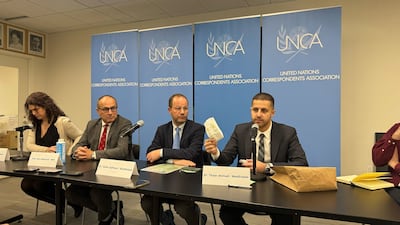British doctors, who visited Gaza as part of emergency teams after the war began, have called for more support for the enclave after witnessing horrors amid the conflict.
Dozens of NHS doctors, including surgeons and anaesthetists, served in Gaza and provided specialised care to civilians injured in the conflict.
What they witnessed has served as key testimony of the mass civilian casualties caused by Israeli air strikes, the absence of medical supplies, and evidence of malnutrition from Israel’s blockade in the enclave.
Doctors who returned from Gaza have become some of the most vocal critics of the war, giving public lectures, media interviews, and briefing governments and international institutions, with many calling for more support for those still living in the enclave.

Although these doctors continue their life-saving work in the UK, they are haunted by the suffering they left behind in Gaza.
“You do feel a lot of guilt. As doctors here in the UK, we have a good quality of life,” said gastrointestinal surgeon Yassar Qureshi, who operates in London and returned from Gaza in May, hours before the closure of the Rafah border.
To cope, he also meets with colleagues who had been there too. “I’ll have a coffee with them, to talk about it,” he said.
Fuelling this is the sense that UK institutions are shying away from the conflict. “When you come back, you’re completely helpless because the institutions have normalised the genocide,” Mr Qureshi said.
With MPs returning to parliament next week, there are revised expectations with the new Labour government’s approach to the Israel-Gaza war.
In the weeks after the election, Foreign Secretary David Lammy restored funding to the UN’s Palestinian agency UNRWA and dropped the former government’s challenge to the International Criminal Court’s arrest warrant.
But as the momentum from these decisions withers, there are growing calls for the UK to ban arms sales to Israel, and for the foreign office to declare what legal guidance it has received with regards to Israel’s conduct.
UK charities advocating on the humanitarian crisis in Gaza have privately complained that their requests for meetings with the foreign secretary have so far been dismissed.
“Come September, the new Labour government will have to start answering questions,” said Chris Doyle, director of the Council for Arab and British Understanding.
Mr Qureshi has learnt to separate what he witnessed from his everyday life back in London. “You have to dissociate and accept you live in a different world, he said.
He stays in touch with doctors he met in Gaza and has given accounts of his time there to colleagues at the surgical department of his hospital. But he is “itching to go back”, he said.
Teams travelling to Gaza since the closure of the Rafah border into Egypt have been doing so through the Israeli border, with more limited access.
Aid agencies have offered follow-up therapy to returning doctors, but many opt for less formal support.
“Nothing has formally been set up since we’ve been back. We meet up informally. We have a chat about things,” said Professor Nick Maynard, an Oxford surgeon who has led multiple missions to Gaza, and briefed former Foreign Secretary Lord Cameron.
Although the experience had not affected his work – “I just cracked on,” he said – it had been taxing physically and emotionally. “I certainly felt it was difficult to process," he said.

Dr Mahim Qureshi, a vascular surgeon in London, said she was unprepared for how she would feel upon her return to the UK in April. “Leaving Gaza was one of the most painful moments of my life," she said - of the guilt she felt when she ended her two-week mission.
"It was the readjustment to NHS life that I found extremely hard. You can’t run around talking about Gaza to everyone."
She recalled a cardiovascular conference that she attended shortly upon her return, which jarred with her experience treating patients in Gaza with basic equipment missing. “People in expensive suits were talking about the most expensive technology used to treat trauma. Tell me how you would cope without a suction or surgical drapes?” she thought to herself at the time.
Meeting with other members of her team in Gaza gives her a chance to let off steam. "We're very close, I will rant with them when need be," she said.
She organised meetings in other hospitals, to present complex cases she had worked on to colleagues. These so-called "grand runs" are part of routine knowledge exchange among NHS doctors. “We received a lot of resistance, a lot of fear," she said. “I was constantly made aware of the personal consequences of speaking out.”

Giving media interviews about what she saw became an outlet – but only for some time. “As time went on, the toll it took was more difficult. I felt like what I was saying was falling on deaf ears. Things were getting worse in Gaza,” she said.
She plans to go again soon and is working to set up an online course for junior doctors in Gaza. She feels it is her duty as a doctor to keep talking about her experiences, and hopes the new government will listen.
“It’s extremely important for us to do our job and tell (politicians) what we saw. People in Gaza are desperate for medical aid and medical equipment. The only solution is a ceasefire. Hepatitis A is rife, Polio is spreading... It needs to stop," she said.


